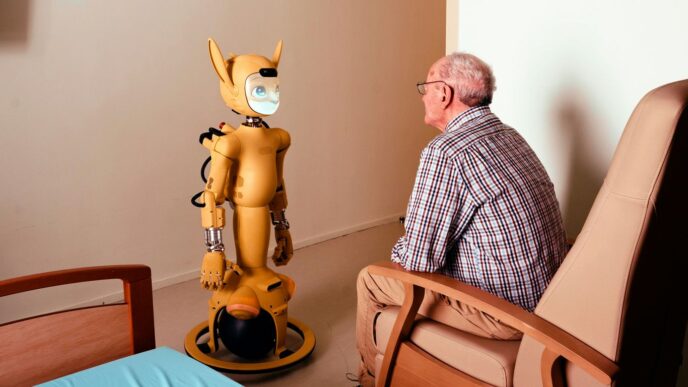AI is changing healthcare fast. It helps with many things, from finding out what’s wrong with someone to making treatments just for them. But with all this new tech, we need to think about rules. This article talks about ai regulation in healthcare and how we can make sure AI helps everyone safely and fairly.
Key Takeaways
- AI is changing healthcare, making things like diagnoses better and care more personal.
- Rules are needed to make sure AI in healthcare is safe and works well.
- It’s important to protect patient data and make sure AI is fair for everyone.
- Working together, like with public and private groups, helps make good AI rules.
- The future of healthcare will likely involve more AI, but human care remains important.
Understanding the Evolving Landscape of AI in Healthcare

AI is changing healthcare fast. It’s not just a future thing; it’s happening now. We’re seeing AI pop up in everything from diagnosing diseases to figuring out the best treatment plans. It’s a wild time, but also a bit confusing, especially when you start thinking about who’s in charge of making sure it’s all done right. An MHA degree can help you navigate this new world.
Impact of AI on Health Outcomes
AI has the potential to really change health outcomes. Some studies suggest big improvements are possible. For example, AI could help doctors spot diseases earlier, leading to quicker treatment and better results. It could also help personalize treatment plans, making them more effective for each person. But it’s not all sunshine and roses. We need to make sure these AI systems are accurate and fair for everyone. AI’s ability to analyze data quickly can lead to more informed decisions.
Current and Proposed Regulatory Frameworks
Right now, the rules around AI in healthcare are still being figured out. There are some existing laws that touch on it, like data privacy regulations, but nothing specifically designed for AI. Different organizations and government agencies are starting to think about what kind of rules we need. It’s a tricky balance – we want to encourage innovation, but we also need to protect patients and make sure AI is used responsibly. It’s a bit of a Wild West situation at the moment, but things are slowly starting to take shape. It’s important to seek out healthcare providers who are using AI responsibly.
AI’s Role in Medical Decision-Making
AI is starting to play a bigger role in helping doctors make decisions. It can analyze tons of data, like medical images and patient records, to find patterns and insights that humans might miss. For example, AI can help radiologists spot tiny tumors on X-rays or CT scans. It can also help doctors predict which patients are at risk for certain diseases. But it’s important to remember that AI is just a tool. Doctors still need to use their own judgment and experience to make the final call. AI should augment, not replace, human judgment and connection in healthcare.
Key Regulatory Considerations for AI in Healthcare
Okay, so AI is making waves in healthcare, right? But it’s not all sunshine and roses. We need to think seriously about how to regulate it so things don’t go sideways. It’s like giving someone a really powerful tool – you want to make sure they know how to use it safely and responsibly.
Ensuring Patient Safety and Efficacy
Patient safety has to be the number one priority. We can’t just throw AI into the mix and hope for the best. It needs to be tested, validated, and monitored constantly. Think about it – if an AI is making recommendations about treatment, we need to be absolutely sure it’s accurate and won’t harm anyone. It’s a big deal. I mean, lives are on the line. We need to make sure new technologies are safe.
Addressing Data Privacy and Security
Data privacy is another huge piece of this puzzle. All this AI stuff relies on data, and a lot of that data is super sensitive patient information. We need to have really strong rules about how that data is collected, stored, and used. No one wants their medical history leaked or misused. It’s about building trust. If people don’t trust that their data is safe, they’re not going to be so keen on using AI-powered healthcare tools. It’s a tricky balance, but we have to get it right. We need to comply with data protection laws.
Promoting Equitable Access to AI Tools
And then there’s the issue of access. We don’t want AI tools to only be available to some people. Everyone should have a fair shot at benefiting from these advancements, regardless of their income, location, or background. It’s about making sure AI doesn’t widen existing health disparities. That means thinking about how to make these tools affordable and accessible to everyone. It’s a challenge, but it’s one we have to tackle head-on. It’s about fairness, plain and simple. We need to think about AI implementation for everyone.
Ethical Challenges and Responsible AI Deployment
Mitigating Bias in AI Algorithms
Okay, so AI is getting big in healthcare, but it’s not all sunshine and roses. One of the biggest worries is bias. If the data used to train AI isn’t diverse, the AI can end up making unfair or inaccurate decisions for certain groups of people. Think about it: if an algorithm is mostly trained on data from one demographic, it might not work as well for people from other backgrounds. This could make existing healthcare disparities even worse. We need to make sure the data sets are diverse and inclusive, and we need ways to measure and fix bias. It’s a big job, but it’s super important if we want AI to help everyone, not just some.
Importance of Human Oversight and Judgment
AI can do some amazing things, but it’s not a replacement for doctors and nurses. It’s more like a tool that can help them do their jobs better. The thing is, AI can make mistakes, and it doesn’t have the same kind of empathy and understanding that humans do. That’s why human oversight is so important. Doctors need to be able to look at what the AI is suggesting and use their own judgment to make the final call. We don’t want to end up in a situation where AI is making decisions without any human input. The success of AI in healthcare depends on it augmenting, not replacing, the crucial role of human empathy. AI can simplify documentation and increase patient engagement, but doctors need to spend more time with patients. Patients are going to seek out doctors who use these tools.
Navigating Potential Pitfalls in AI Implementation
There are definitely some potential problems we need to watch out for as AI gets more common in healthcare. One is data privacy. AI needs a lot of data to work, and that data can be really sensitive. We need to make sure we have strong rules in place to protect patient information. Another thing is making sure AI is used responsibly. We don’t want AI to be used in ways that could harm patients or make healthcare less accessible. It’s also important to remember that AI is just a tool. It’s up to us to use it in a way that benefits everyone. We need to address ethical and practical challenges, and realize the importance of human oversight. We need to ensure that new technologies are thoroughly tested and that AI models are fair and accurate.
Navigating the Path Forward for AI Regulation
It’s clear that AI is changing healthcare, but figuring out how to regulate it is a big task. It’s not something any one group can do alone. We need everyone working together to make sure AI helps patients and doesn’t cause new problems.
Collaborative Efforts in Policy Development
Getting AI regulation right means everyone needs to be at the table. This includes doctors, patients, tech companies, and government officials. Each group brings something different. For example, doctors know what patients need, and tech companies know what AI can do. When everyone works together, the rules we make are more likely to work in the real world. It’s like building a house – you need architects, builders, and homeowners to agree on the design.
Public-Private Partnerships for Progress
Think of it like this: the government has the resources and authority to set rules, but private companies have the know-how to build AI. When they team up, they can do more than either could alone. These partnerships can help us test new AI tools, figure out what works, and write better regulations. It’s not just about making money; it’s about making sure AI helps everyone.
Integrating Real-World Needs into AI Development
AI isn’t just about fancy algorithms; it’s about solving real problems. That means we need to listen to what doctors and patients actually need. Are they struggling with diagnosis? Do they need help managing chronic diseases? If we focus on these real-world needs, we can make sure AI is actually useful. It’s like building a bridge – you need to know where people want to go before you start building.
The Future of AI Regulation in Healthcare
Shifting Dynamics of Patient Expectations
Okay, so picture this: right now, if your doctor said they were using AI for your diagnosis, you might be a little weirded out. "I came to see you!" But, get this, that’s gonna flip. Soon, patients will actively look for doctors who use AI. It’s like wanting the latest tech – people will see it as cutting-edge and the way things should be done. This shift will put pressure on healthcare systems to adopt AI, and regulations will need to keep up with these changing expectations. It’s not just about accepting AI, it’s about demanding it.
Proactive Health Systems with AI Integration
Imagine a healthcare system that’s always one step ahead. That’s the promise of AI. Instead of just reacting to problems, AI can help predict them and keep people healthier for longer. Think personalized health plans, early warnings for potential health issues, and treatments tailored to your specific needs. This proactive approach will require a whole new set of regulations, focusing on data sharing, privacy, and making sure everyone benefits, not just a select few. The idea of the proactive health system is an exciting one.
Fostering a Multidisciplinary Approach
AI isn’t going to replace doctors and nurses, it’s going to work with them. The future of healthcare is all about teamwork – doctors, AI specialists, ethicists, and regulators all working together. We need to build systems that support this multidisciplinary approach, making sure everyone has a voice and that AI is used in a way that’s both effective and ethical. It’s about combining the power of AI with the human touch, ensuring better outcomes and a more compassionate approach. It’s important to instill the idea of humanity, focusing on how we build a system that supports the multidisciplinary approaches that medicine has always done.
Here’s a quick look at how different roles might evolve:
| Role | Current Focus | Future Focus with AI |
|---|---|---|
| Doctors | Diagnosis, Treatment | Collaboration with AI, Personalized Care |
| Nurses | Patient Care, Monitoring | AI-Assisted Monitoring, Data Analysis |
| Regulators | Compliance, Safety | Ethical AI Use, Data Privacy, Equitable Access |
| AI Specialists | Algorithm Development | Bias Mitigation, Explainable AI, System Integration |
Augmenting Human Expertise with AI

Enhancing Diagnostic Accuracy with AI
AI is making some real waves in how we figure out what’s wrong with people. It’s not about replacing doctors, but giving them a serious boost. AI algorithms can sift through mountains of data – think medical images, patient histories, and research papers – way faster than any human could. This means spotting things that might get missed, leading to quicker and more spot-on diagnoses. It’s like having a super-powered assistant that never gets tired. For example, AI can help identify patterns in medical images that might be missed by the human eye, leading to earlier and more accurate diagnoses. clinical equations are being improved with AI.
Delivering Personalized Patient Care
One of the coolest things about AI is how it can help tailor treatments to each person. Forget one-size-fits-all approaches. AI can look at your genes, your lifestyle, your medical history, and come up with a plan that’s just for you. This could mean better results and fewer side effects. It’s about getting the right treatment to the right person at the right time. AI can also increase patient engagement by providing personalized health information and reminders. This helps patients stay informed and take an active role in their healthcare. The success of AI in healthcare hinges on its ability to augment, not replace, the crucial role of human empathy, judgment and connection in the delivery of care.
Empowering Providers with Advanced Technology
AI isn’t just for patients; it’s a game-changer for doctors and nurses too. It can take over some of the more tedious tasks, like paperwork and data entry, freeing up healthcare pros to focus on what they do best: taking care of people. Plus, AI can give them access to the latest research and best practices, right at their fingertips. It’s like giving them a super-smart assistant that helps them make better decisions. Health outcomes could improve by 40% and treatment costs could be reduced by 50% with the use of artificial intelligence (AI), according to the Harvard School of Public Health.
AI is becoming an active participant in medical decision-making. Algorithms can analyze vast amounts of data faster than any human, providing insights that can aid in diagnosis and treatment planning.
Here’s a quick look at how AI is helping doctors:
- Simplifying documentation: AI can streamline the documentation process, making it easier for doctors to keep accurate records. This reduces the time spent on paperwork, allowing doctors to focus on patient care.
- Increasing patient engagement: AI can also increase patient engagement by providing personalized health information and reminders. This helps patients stay informed and take an active role in their healthcare.
- Enhancing communication: By improving communication between doctors and patients, AI can strengthen the patient-doctor relationship. This leads to better patient outcomes and higher satisfaction with care.
Wrapping It Up
So, we’ve talked a lot about AI in healthcare and how it’s changing things. It’s clear that this technology has a lot of good stuff it can do, like helping doctors figure out what’s wrong faster or making treatments more personal. But, like with anything new, there are some things we need to be careful about. Things like making sure everyone can use it, keeping patient information safe, and making sure the AI doesn’t make unfair choices. It’s a big job, and it means people from different groups, like researchers, government folks, and even regular people, need to work together. The goal is to use AI to make healthcare better for everyone, but in a way that’s fair and safe. It’s a journey, not a sprint, and we’re all in it together.
Frequently Asked Questions
How does AI help doctors and patients?
AI helps doctors make better choices by looking at lots of patient information quickly. This can lead to faster and more accurate diagnoses, and even help create special treatment plans for each person.
What are the biggest concerns about using AI in healthcare?
The main worries are making sure AI is fair to everyone, keeping patient information private, and making sure the AI tools actually work and are safe to use.
Why do we need rules for AI in healthcare?
Rules are being made to make sure AI in healthcare is safe, works well, and is used in a way that is fair for all patients. These rules also help protect private health information.
How important is it for humans to still be in charge when AI is used?
It’s super important! Humans need to check what AI suggests because AI can sometimes make mistakes or be unfair if the data it learned from wasn’t good. Doctors’ wisdom and care are still key.
What does it mean for AI to have “bias”?
AI can sometimes be unfair if it learns from patient data that doesn’t include everyone. For example, if it’s mostly trained on data from one group of people, it might not work as well for others.
Who is making the rules for AI in healthcare?
Many groups, like governments, hospitals, and tech companies, need to work together to make good rules for AI. This way, the rules will make sense and help everyone.












